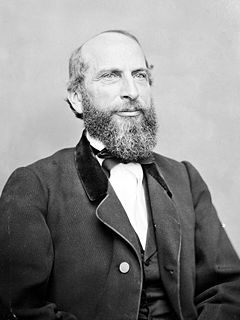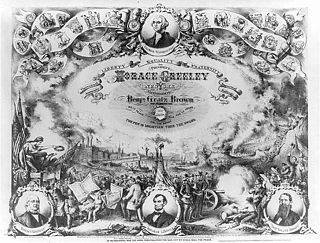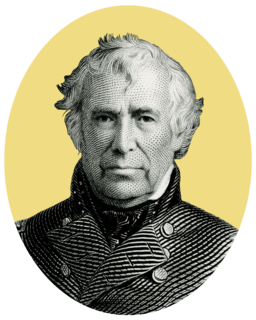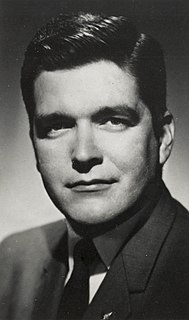Related Research Articles

The 1856 United States presidential election was the 18th quadrennial presidential election, held on Tuesday, November 4, 1856. In a three-way election, Democrat James Buchanan defeated Republican nominee John C. Frémont, and Know Nothing nominee and former President Millard Fillmore.

The 1872 United States presidential election was the 22nd quadrennial presidential election, held on Tuesday, November 5, 1872. Despite a split in the Republican Party, incumbent President Ulysses S. Grant defeated Democratic-endorsed Liberal Republican nominee Horace Greeley.

The 1884 United States presidential election was the 25th quadrennial presidential election, held on Tuesday, November 4, 1884. It saw the first election of a Democrat as President of the United States since James Buchanan in 1856 and the first Democratic president since the American Civil War. Governor Grover Cleveland of New York defeated Republican James G. Blaine of Maine. The election was set apart by unpleasant mudslinging and shameful personal allegations that eclipsed substantive issues, for example, civil administration change.

Richard Wigginton Thompson was an American politician.

James Speed was an American lawyer, politician, and professor. In 1864, he was appointed by Abraham Lincoln to be the United States Attorney General. He previously served in the Kentucky Legislature, and in local political office.

The Liberal Republican Party was an American political party that was organized in May 1872 to oppose the reelection of President Ulysses S. Grant and his Radical Republican supporters in the presidential election of 1872. The party emerged in Missouri under the leadership of Senator Carl Schurz and soon attracted other opponents of Grant. The party sought civil service reform and opposed Grant's Reconstruction policies, particularly the Enforcement Acts which destroyed the Ku Klux Klan. It lost in a landslide and disappeared from the national stage after the 1872 election.
The 1948 Democratic National Convention was held at Philadelphia Convention Hall in Philadelphia, Pennsylvania, from July 12 to July 14, 1948, and resulted in the nominations of President Harry S. Truman for a full term and Senator Alben W. Barkley of Kentucky for vice president in the 1948 presidential election. One of the decisive factors in convening both major party conventions in Philadelphia that year was that the eastern Pennsylvania area was part of the newly developing broadcast television market. In 1947, TV stations in New York City, Washington and Philadelphia were connected by a coaxial cable. By the summer of 1948 two of the three new television networks, NBC and CBS, had the ability to telecast along the east coast live gavel-to-gavel coverage of both conventions. In television's early days, live broadcasts were not routinely recorded, but a few minutes of Kinescope film of the conventions has survived.

The 1848 Whig National Convention was a presidential nominating convention held on June 7 in Philadelphia. It nominated the Whig Party's candidates for president and vice president in the 1848 election. The convention selected General Zachary Taylor of Louisiana for president and former Representative Millard Fillmore of New York for vice president.

Roderick Randum Butler was an American politician who represented Tennessee's 1st district in the United States House of Representatives from 1867 to 1875, and again from 1887 to 1889. He also served several terms in the Tennessee state legislature, and briefly served as a state court judge. An opponent of secession, Butler represented Johnson County at the East Tennessee Convention in 1861, and afterward joined the Union Army.

Octavius Valentine Catto was an educator, intellectual, and civil rights activist in Philadelphia. He became principal of male students at the Institute for Colored Youth, where he had also been educated. Born free in Charleston, South Carolina, in a prominent mixed-race family, he moved north as a boy with his family. He became educated and served as a teacher, becoming active in civil rights. He also became known as a top cricket and baseball player in 19th-century Philadelphia, Pennsylvania. A Republican, he was shot and killed in election-day violence in Philadelphia, where ethnic Irish of the Democratic Party, which was anti-Reconstruction and had opposed black suffrage, attacked black men to prevent their voting for Republican candidates.

This is a selected bibliography of the main scholarly books and articles of Reconstruction, the period after the American Civil War, 1863–1877.

The 1872 Republican National Convention was held in Philadelphia, Pennsylvania, June 5–6, 1872. President Ulysses S. Grant was unanimously nominated for reelection by the convention's 752 delegates. Vice President Schuyler Colfax was for some time considered a potential rival to Grant for the presidential nomination, and had declared himself open to the prospect should Grant decide not to run for a second term, a stance that alienated him from both the President and his many supporters. Further damage resulted when a small movement within the Liberal Republican Party sought to enter his name for their presidential nomination. While neither amounted to more than speculation, it likely cost him his chances for renomination. Colfax narrowly missed the mark, garnering 321.5 delegates to Massachusetts Senator Henry Wilson's 399.5, President Grant being among those many notables who remained on the sidelines as the balloting had taken place.
The 1880 Democratic National Convention was held June 22 to 24, 1880, at the Music Hall in Cincinnati, Ohio, and nominated Winfield S. Hancock of Pennsylvania for president and William H. English of Indiana for vice president in the United States presidential election of 1880.

The 1872 Democratic National Convention was a presidential nominating convention held at Ford's Grand Opera House on East Fayette Street, between North Howard and North Eutaw Streets, in Baltimore, Maryland on July 9 and 10, 1872. It resulted in the nomination of newspaper publisher Horace Greeley of New York and Governor Benjamin Gratz Brown of Missouri for president and vice president, a ticket previously nominated by the rump Liberal Republican faction convention meeting, also held in Baltimore's newly built premier Opera House of nationally well-known theatre owner/operator John T. Ford of the major Republican Party, which had already re-nominated incumbent President Ulysses S. Grant of the regular Republicans for another term.
James Henry Harris (1832–1891) was an American civil rights advocate, upholsterer, and politician. Born into slavery, he was freed as a young adult and worked as a carpenter's apprentice and worker before he went to Oberlin College in Ohio. For a time, he lived in Chatham, Ontario, where he was a member of the Chatham Vigilance Committee that aimed to prevent blacks being transported out of Canada and sold as slaves in the United States.

The four boxes of liberty is an idea that proposes: "There are four boxes to be used in the defense of liberty: soap, ballot, jury, and cartridge. Please use in that order."

The 1864 National Union National Convention was the United States presidential nominating convention of the National Union Party, which was a name adopted by the main faction of the Republican Party in a coalition with many, if not most, War Democrats after some Republicans and War Democrats nominated John C. Frémont over Lincoln. During the Convention, the party officially called for the end of the ongoing Civil War, the eradication of slavery and the adoption of the Emancipation Proclamation.

The Lily-white Movement was an anti-black political movement within the Republican Party in the United States in the late 19th and early 20th centuries. It was a response to the political and socioeconomic gains made by African-Americans following the Civil War and the Thirteenth Amendment to the Constitution, which eliminated slavery "except as punishment for a crime".
The Negro Republican Party was one name used, in the period before the end of the civil rights movement, for a branch of the Republican Party in the Southern United States, particularly Kentucky, that was predominantly made up of African Americans.
References
- ↑ "Butler, William F." University of Kentucky Libraries. Retrieved 2022-02-22.
- ↑ Anne Elizabeth Marshall (2010). Creating a Confederate Kentucky: The Lost Cause and Civil War Memory in a Border State. UNC Press Books. p. 93. ISBN 978-0-8078-3436-7 . Retrieved 2010-10-04.
- ↑ Paul Cimbala (2010). The Great Task Remaining Before Us: Reconstruction as America's Continuing Civil War. Fordham Univ Press. p. 66. ISBN 978-0-8232-3203-1 . Retrieved 2010-10-04.
- ↑ "Philadelphia: Preparations for the Republican National Convention" (PDF). New York Times. June 3, 1872. Retrieved 2010-10-04.